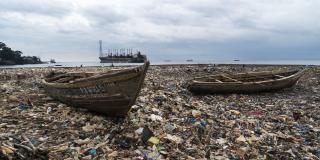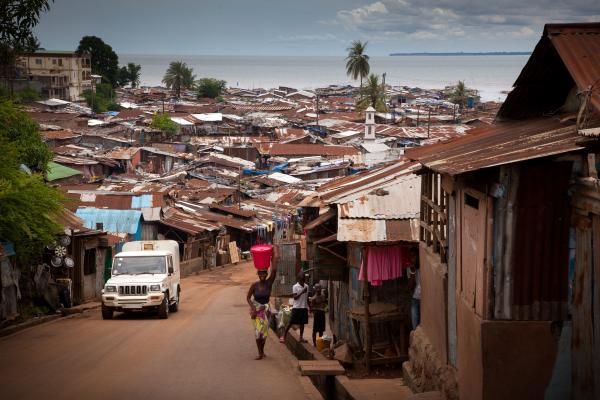
In Freetown, Sierra Leone, tens of thousands of people live with a sea of plastic waste on their doorstep. They're suffering disease, death and indignity. One volunteer is determined to make a stand on behalf of his community.
Inside Kroo Bay
In Kroo Bay, people’s homes are often built upon a layer of garbage. The coating of rubbish is around three to five feet deep, beneath which lies sand. With such poor foundations, houses are often unstable and vulnerable to flooding.
The rubbish is a mixture of plastic items like water sachets, empty bottles, broken toys, as well as other bits of household waste, food scraps and even human faeces. It's a toxic recipe for the natural environment, as well as for human health.
More than 10,000 people call Kroo Bay home. One of these residents is Saidu Turay, a 50-year-old VSO community volunteer. He is hard at work raising awareness of the hazards in his community.
A disaster in slow motion
Thirty years ago, Freetown’s beaches were clean, and there were dumpsites to manage the city’s waste.
Saidu moved to Kroo Bay as a young man and has seen the staggering transformation the slum has undergone.
“When I arrived, the sand was clean and you could use the river water for washing, bathing and laundry.”
The human cost
In the rainy season, an accumulation of rubbish causes rivers to flood.
“When it rains, people do not have peaceful nights or days. Homes start to flood and people have to take their property elsewhere for safe keeping.”
Rubbish in drains and gutters can also cause water to stagnate, leading to disease.
“The seaside slums have disease outbreaks and floods, but the rent is cheap so poor people live here.”

According to a local clinic, diarrhoea is the most common health complaint, which can lead to malnutrition.
Following training on hazard mitigation by VSO and Sierra Leone’s Office of National Security, Saidu has organised community clean-ups, removing litter from Kroo Bay’s river.
“I teach the community there are two kinds of disaster: natural and manmade.
“We pay closer attention to manmade hazards, because we can show people how to reduce hazards in their area,” says Saidu, who encourages the community to clean regularly by holding awareness meetings and spreading the word with his megaphone.
A drop in the ocean?
While it might seem like a losing battle against the tide of plastics and general waste, Saidu is slowly but surely making life safer for residents of Kroo Bay through clean-up initiatives and awareness raising.
Saidu knows exactly what is at stake, here in Kroo Bay.
“If the conditions of Kroo Bay improve, lives will improve. You will see children grow up healthier, reach age five without dying or getting sick, and their life expectancy will increase.”
“People here just want decent houses, with electricity, a clean water supply, proper sanitation conditions, education and jobs.”
The statistics on plastic pollution are shocking. An estimated one million plastic bottles are bought each minute, and each year, around one trillion plastic bags are used globally.
The majority of this plastic isn’t reused either: only nine percent of plastic used worldwide ever gets recycled.
In our throwaway culture, we’re headed for catastrophe: by 2050, the oceans are expected to contain more plastic than fish, by weight.
But lost in all the discussion around plastic is the effect it has on the world’s poorest people.
A few of us are fortunate enough to live in countries where the rubbish we throw away simply disappears - as if by magic - managed by our waste disposal systems.
The population of Kroo Bay, a slum area located on the coastline in central Freetown, Sierra Leone, does not have this privilege. The residents here are confronted by the reality of the world’s waste problem every day.
No one would consider bathing in this water now. In the past 30 years, waste disposal in Freetown has gone unchecked, and dumpsites have closed down. Land once used for rubbish collection has since been repurposed for housing.
Simultaneously, Freetown’s population has increased, as people have migrated to the city to find work. The slums have become overpopulated, with an increasing demand on housing in Freetown.
The sloped landscape of Freetown also provides a clue as to why so much rubbish ends up in coastal slums. When it rains, litter is brought down from the hilltops, carried by the city’s rivers and gutters, collecting in Kroo Bay.
Not just a plastic problem
Rubbish is one problem in Kroo Bay, but poor infrastructure and an expanding population have also increased the likelihood of disasters.
“In the time I’ve lived here, the population has doubled in size,” says Saidu.
There are no roads through Kroo Bay, which means if a fire breaks out, emergency services only have access on foot.
Sanitation is an issue too. The sandy terrain makes it near impossible to install proper plumbing and toilet facilities.
“People don’t have a household toilet. Instead they use a bucket, and then empty the bucket into the river.”
During the rainy season, this contaminated water is washed into open drinking water wells.
“People live in these conditions because there are no alternatives,” says Saidu.
Saidu says that people move to Freetown for better job opportunities and the promise of a better education for their children. Even so, many people don’t have secure livelihoods.
“Most people in this slum can't find proper employment and depend on petty trading and odd jobs for their livelihood.”
Read more
Meet the teacher volunteering in the Rohingya refugee camps
Thousands of Rohingya children are living in the refugee camps. They’re out of school and risk being left behind for good, but VSO education volunteer Fiona Kirby is working to help them
